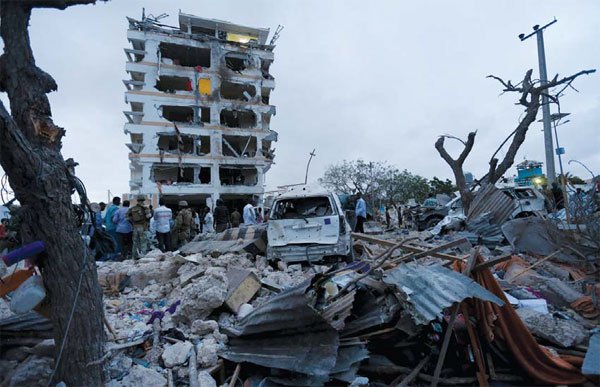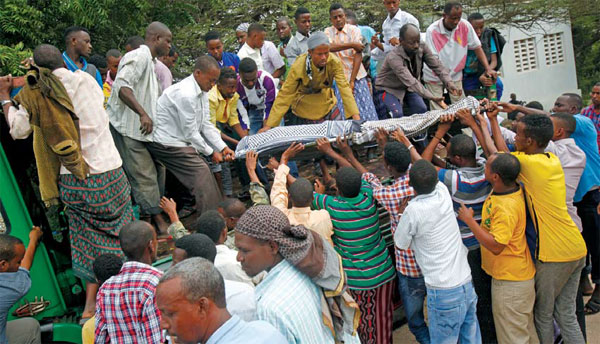China bolsters embassy after attack

Beijing acts quickly after suicide bombing kills Chinese security staffer, 14 others
Beijing dispatched a government mission to reinforce the Chinese embassy in Somalia, damaged in a suicide bombing on July 26, and to bring home the body of a staff member killed in the attack, officials said.
The terrorist attack on the heavily guarded compound that housed China's embassy in Mogadishu is likely to lead to security upgrades for the nation's diplomats in the strife-torn nation, observers say.
| Somali government soldiers stand outside the ruins of the Jazeera hotel after an attack in Somalia's capital Mogadishu, on July 26, Reuters |
| Mourners carry the body of journalist Mohamed Abdikarim Moallim Adam, a reporter for the London-based Universal television, at his funeral in Mogadishu, on July 27, AP |
A suicide bomber detonated a car at the gate of the Jazeera Palace Hotel in the Somali capital at around 4 pm on July 26, killing at least 15 people. Al-Shabab, an al-Qaida-affiliated terrorist group, claimed responsibility.
The well-guarded luxury Jazeera Hotel has been a popular meeting point for foreigners in the turmoil-roiled country and home to diplomatic missions from Qatar and the United Arab Emirates, as well as China.
Foreign Ministry spokesman Lu Kang released a statement saying that "one embassy staff member in charge of security and guard duties" died of serious injuries sustained in the attack, and that three other embassy staff suffered slight injuries.
Lu said China also expressed condolences for all of those killed in the attack, adding that "all the staff of the embassy have been transferred to a safe area".
China lodged representations to Somalia in both Mogadishu and Beijing, and Somalia has said it will take all necessary measures to ensure the safety of China's institutions and personnel based there.
Photos purported to be of the bombing scene went viral on the Chinese social network Weibo after they were posted through an account verified as that of a Chinese diplomat. The account holder, @xingzheyuyang, said the pictures were taken by colleagues at the Chinese embassy in Somalia.
"Although the embassy's premises have been fatally bombed, it is still a battlefield that deserves to be defended and championed with blood and bodies! This is the ultimate reality of the site, the diplomats and the diplomatic life," the poster said.
The photos showed unidentified individuals carrying bandages, and most of those in the pictures wore helmets and bulletproof vests.
The post was retweeted more than 7,000 times within 24 hours, and netizens posted nearly 1,000 comments on it. One Weibo user said: "Salute! We are thankful for having you!"
The Foreign Ministry said in a written reply to China Daily that "a working group established by the ministry and other relevant departments has headed to Somalia to assist tackling the aftermath" of the attack, and that officials had "embarked on a timely missions to rescue and treat injuries as well as to transfer the remains of the victim back to the country".
The office said that the overall situation of the embassy staff there is good, and "the current priority of the embassy is affairs regarding emergency treatment". The embassy, it said, will "get jobs in other fields done" after priority items are handled.
Liu Guijin, former special representative of the Chinese government on African affairs, urged the Somali government to "offer more powerful protection to China's diplomatic missions there".
"Currently the overall situation in Somalia is improving, but the security conditions there are not adequate yet to allow economic cooperation on a very large scale," Liu says.
The attack "does not seem to be specifically targeting China" because the suicide bomber's car followed vehicles of the African Union near the hotel. Liu says that the Chinese embassy will continue its day-to-day missions.
He Wenping, a senior researcher in African studies at the Chinese Academy of Social Sciences, says relocation of the Chinese embassy is possible as a security countermeasure, and a new location could be set "in a certain area surrounded by diplomatic compounds rather than at a standalone location amid civilian residences".
"Areas close to local governmental organs are also ideal. After all, the security precautions there are more reliable. The Chinese embassy should come up with multiple measures to guard its staff against harm," He says.
He notes that al-Shabab, having vowed to be loyal to al-Qaida years ago, "has been turning to launching more terrorist attacks after it lost its peak of power and started to shrink".
Al-Shabab captured most of southern Somalia in 2006. It was militarily defeated by Somali and Ethiopian forces the next year, but still has significant power.
Since a face-to-face battle against the government and African Union troops is not a favorable option for the group, suicide attacks on high-value targets cause the greatest sensation, He notes. "It is aiming at larger influence in the world, having no concern about its image."
Twenty people, including seven militants, died when the group attacked the UN Development Programme office in 2013 with a truck bomb and gunmen.
China closed its diplomatic offices after the escalation of civil war and the fall of Siad Barre's administration in 1991. Like other countries, it continued its relationship with the country through its mission based in Nairobi. China reopened its embassy in Mogadishu in October at the hotel.
Somali President Hassan Sheikh Mohamud said the attack would not cow his government. "I have a message for the terrorists: The Jazeera Palace will be rebuilt and it will soon be back in business."
Yuan Tiecheng, founder and CEO of Riskon International, a security company based in Beijing, says a suicide bomb attack, such as the one at the hotel, is usually attempted after terrorists have carefully prepared and detected security risks.
Yuan suggested enterprises and agencies operating in areas of turmoil consult professional security organizations and companies to develop effective countermeasures.
Demanding security challenges are not uncommon for diplomatic missions in war-torn nations, where deadly bombings, forced closure of embassies and use of temporary accommodations in hotels are often seen.
In 1999, three Chinese reporters were killed when bombs fell on the Chinese embassy during a United States-led NATO bombing on Belgrade, Yugoslavia. In 2013, a mortar shell fell into the compound of the Chinese embassy in Damascus, slightly injuring a Syrian employee.
All Chinese staff members at the nation's embassy in Iraq left Baghdad in 2003 before a coalition led by the US invaded Iraq to depose Saddam Hussein. The embassy compound and much of the city was subsequently heavily damaged during the war. When staff members were able to return, the Al Mansour Hotel in Baghdad was chosen as a transitional home.
One of the latest evacuations happened in April when the Chinese embassy in Sanaa, Yemen, and consulate in Aden were temporarily closed following worsening turmoil within the country.
The Mogadishu suicide attack comes a day after the murder of a Somali lawmaker in Mogadishu on July 25.
The UN Security Council on July 27 condemned the attack "in the strongest terms". In a statement released in New York, the members of the council offered their condolences to the peoples and governments of Somalia and of China.
The 15-member body recalled the fundamental principle of the inviolability of diplomatic and consular premises, and the obligations of host governments to take all appropriate steps to protect them against any intrusion or damage.
Yang Yixi, Xinhua and AFP contributed to the story.
zhangyunbi@chinadaily.com.cn
(China Daily European Weekly 07/31/2015 page14)
Today's Top News
- Japan tempting fate if it interferes in the situation of Taiwan Strait
- Stable trade ties benefit China, US
- Experts advocate increasing scope of BRI to include soft power sectors
- New engine powers cargo drone expansion
- China to boost green industry cooperation
- Manufacturing PMI rises in November
































